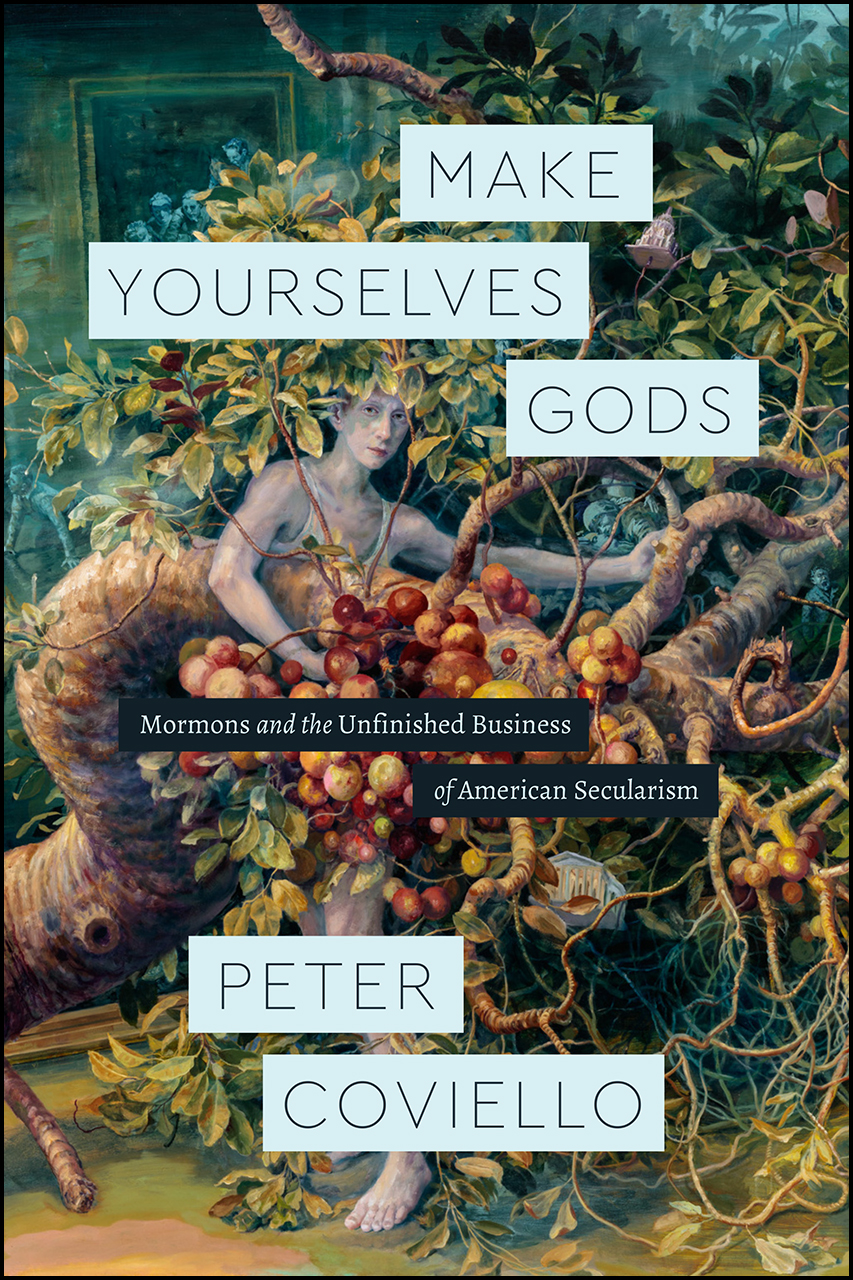
Title: Make Yourselves Gods: Mormons and the Unfinished Business of American Secularism
Author: Peter Coviello
Publisher: University of Chicago Press
Genre: Religious Studies
Year Published: 2019
Number of Pages: 239
Binding: cloth, paper, ebook
ISBN10: 0-226-47433-X
ISBN13: 978-0-226-47433-5
Price: $87 (cloth) $29 (paper) $29 (ebook)
Reviewed by Kristine Anderson for the Association for Mormon Letters.
As someone who has followed and collected many titles in Mormon studies over the last ten years, I did not expect a revisionist history of Mormonism written by an English professor at the University of Chicago to become one of my favorite works. I am not a scholar, so my taking to such a theoretical, academic work surprised me. It is a new argument in the developing field of secularism, one that will surely be used in university classrooms. And yet here we are: in Make Yourselves Gods, Peter Coviello applies new lenses to our story, and using both the history of American secularism and queer studies, makes several proactive arguments; and he does so at times, with a beautiful prose I have meticulously underlined.
I’m not sure anything else like this exists; Coviello uses political theology, native studies, and queer critique to create a new way to understand “orthodoxy, citizenship, and the fate of the flesh in nineteenth century America,” it seeks to have a conversation with Mormon studies and also depart from how it has been done in the past. In his writing I find an admiration for and acknowledgement of the beauty that Joseph’s “persistent leaning toward the breezily heretical” birthed into the world.
The chief objectives Coviello specifies are to first, make a new reading of early Mormonism through queer lenses and critique; second, to resist and push back against two main ways Mormonism has been analyzed (much work has been focused on disproving Mormonism, but he feels many scholars have too often leaned into sanitizing the narrative in response) and sees both as a result of the pressures of secularization; and the third and main purpose, is to formulate a grammar and vocabulary for the developing critical body of work on secularism. The book both is and is not about Mormonism — Coviello describes the process of writing about secularism here that by shining a light on the story of Mormonism, one can see in the relief of the shadow it casts what American secularism is and has been.
Gratefully, the author spends the first section of the book explaining the frameworks of secularism for the uninitiated like me. As someone whose exposure to “secularism” is mostly limited to what I’ve heard over the pulpit of general conference sessions, I was surprised to learn that secularism is not the scary, worldly, opposing forces against the “religious.” Instead, especially in the context of protestant Americanism, secularism is a construct of “good religion.” Our culture and nation have not only accepted, but favored certain religious beliefs, these are “good religions” — but what happens to the groups whose beliefs lay out of favor? These are “bad beliefs,” ones that are suspect and need to be controlled and/or eliminated through civic forces. Thus, we encounter biopolitical analysis, an intersectional field of both human biology and politics.
After the introduction, the book is laid out in two sections, the first about how gender and sexuality intersect with Smith’s embodied cosmology. In my own faith journey, I have struggled with the doctrine of embodied divinity; for me it raises a host of questions about race, gender, sexuality, and priesthood. To Coviello, the radical theology of Godliness and bodiliness intertwining centers on the joy that comes from pleasure, and while many analyses see polygamy as a mere appendage of Mormonism, Coviello argues it is actually the defining center of Smith’s vision of exaltation. By using the narrative of Zina D. Young, Coviello analyzes the practical ways this cosmology both limits and frees Mormonism’s women. The second section regards race and Mormonism. He analyzes the Book of Mormon as an anti-racist text in its telling a story of imperial hubris. He highlights many of the layers of complexity in the racial narrative and how one of the main stumbling blocks to us seeing it that way is our own community’s journey from being heretics on race to assimilating into whiteness with a hyper-conformity.
In the conclusion he uses the lens of queer theory to analyze the whole project; queer theory here is not referring to the queerness of Mormonism, but queerness as being deviant from the status quo. What do biopolitical forces do to deviants? How and why have Mormons gone from one of the most notorious “bad beliefs” in civic life to one of the most accepted and normal? How have the forces and pressures of American society shaped what we have become? Is this a good thing or a bad thing?
If you decide to pick up Make Yourselves Gods, and I hope you do, be prepared for dense theoretical frameworks you may or may not be able to grasp—I didn’t always. There were times I would read and re-read whole paragraphs and not know what it meant, and I occasionally wanted to leave it unfinished since it was a bit beyond my grasp. I am glad I did not give up. While Coviello employed theoretical lenses to the story of Mormonism for the benefit of an ongoing scholarly conversation – the result for this housewife in Idaho has been a deeper love for my native faith. As with a kaleidoscope, sometimes all it takes is spinning a lens to transform something old and ordinary to vibrant and full of possibility. While Coviello gave me outside lenses to see the beauty of my own story again, he did not save me from questions to be wrestled with; I have no new answers, only new lenses.
